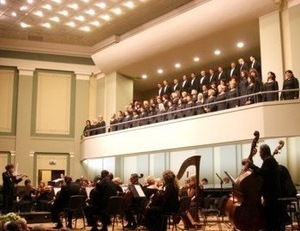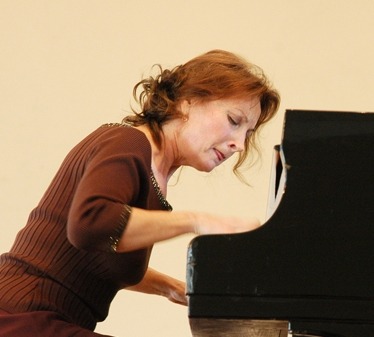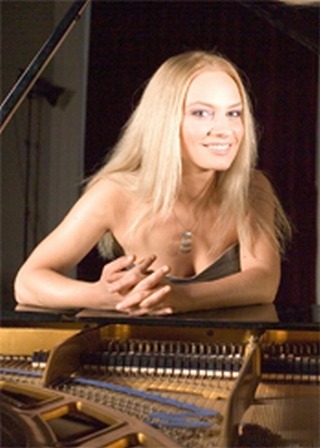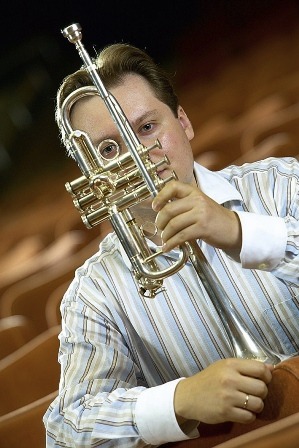HIGH-SOUNDING BEGINNING IS OUTSET FOR GREAT WORK 0
(Impressions from the cycle of concerts “Music is Eternity” dedicated to the opening of Kaunas Philharmonic)Vaiva Mažulytė
www.kamane.lt , 2008 10 09
Photo by A.Barzdžius
M.Rubackytė
M.Jatkauskaitė
A.Kavalinski
In brief: “Music is Eternity” – by this high-sounding slogan the renovated Kaunas State Philharmonic met October 1, the International Music Day and the new concert season. It invited listeners to the most prestigious Kaunas concert hall to the cycle of five concerts after a break of three years.
Kaunas musicians reigned on the stage during the opening evening. Kaunas Symphony Orchestra (chief conductor Modestas Pitrėnas) conducted by Petras Bingelis started the concert by the symphony of Kaunas composer Vidmantas Bartulis “Return”. The premiere work that lasted hardly ten minutes spread the meditative and contemplative mood. Music that is more suitable to theatre or a cinema film (and that could not be called a symphony) was a perfect counterbalance for the solemn and monumental programme of the evening.
When Kaunas State Choir (art director and chief conductor P. Bingelis) and the pianist Mūza Rubackytė joined the orchestra later, fantasy of L.van Beethoven for the fortepiano and orchestra op.80 was played. The impressive work, in the finale of which the notes from the 9th symphony are heard, made a rather unexpected impression. The performers tried too hard to show the solemnity and monumentality of the fantasy, and it seemed that the real meaning of music was forgotten for a while.
The second part of the concert became a pleasant tribute to admirers of popular classic music. A cocktail of joyful, emotional and majestic music from the overture of G.Rossini opera “Semiramide”, “Polovian Dances” from the opera of A.Borodin “Duke Igor”, intermezzo from R.Leoncavallo opera “Merry-andrews” and final choir from G.Verdi opera “Aida” resounded.
Kaunas Symphony Orchestra played beautifully that evening. It is evident that the musicians are becoming more and more professional on the technical and interpretation level. Only more dramatic colours were missing while performing the intermezzo by R.Leoncavallo.
After the first evening that was monumental by the number of performers on the stage, the second evening was entrusted to two masters of music – pianist Petras Geniušas and saxophone player Vladimiras Čekasinas, who played on the themes of jazz and classics cheerily.
The third concert was organised by the Lithuanian Chamber Orchestra, conductor from Great Britain Nicholas Cleobury and the trumpet player from Belgium Andrei Kavalinski. The trumpet, which is not popular as a solo instrument in Kaunas and Lithuania, revealed all its wonderful colours that evening. However, it was heard by listeners who filled only half of the hall. The concert was exceptional for the programme and the incredible professionalism of the performers.
The dialogue of the conductor N.Cleobury and the Lithuanian Chamber Orchestra sounded really well. The concert was crowned by the concert of A.Ponchielli requiring much mastery from the soloist. Andrei Kavalinski surprised by the skills of continuous breathing. The copper trumpet sounded really softly in his hands.
On Saturday the road of eternal music was stretched by Kaunas String Quartet and the soloist Rita Preikšaitė. The performers chose music of sacral and lyrical type. The evening programme was framed by “Salve Regina” by F.Schubert and “Ave Maria” by P.Mascagni. Small plays in which Virgin Mary was addressed sounded softly and lyrically. Still, the wonderful melody of “Ave Maria” was hindered by the unbalanced sound of the quartet musicians and the soloist’s voice.
The climax of the evening was the lyrical poem of O.Respighi for the mezzo soprano and quartet “Sunset” (“Il Tramonto”) telling about a loss of a beloved man. Rita Preikšaitė expressed complicated feelings of her heroine sensitively. By using voice sparingly and concentrating to the main climax points of the work, the soloist showed that she was a wonderful interpreter of chamber music.
The last concert dedicated to the opening of the Philharmonic that took place on October 5 could be estimated very controversially. The concert presented an astounding discovery - the young pianist Martyna Jatkauskaitė, but the choice of the concert programme appeared strange. What common features are there between the cycle of concerts “Music is Eternity” and the presentation of a CD with variety music? Is only the name of Virgilijus Noreika and Kaunas Symphony Orchestra on the CD cover sufficient?
The first part of the concert was dedicated to the concert for the fortepiano and orchestra No.3 c major op.26 of S.Prokofyev, called one of the most complicated works of this genre. Incredible technical mastery, temperament, self-trust – all this helped the 24-year-old pianist M.Jatkauskaitė overcome the hard task. However, what feelings could appear when the wonderful concert by S.Prokofyev was followed by a song of A.Raudonikis “Tenderness” performed by V. Noreika? Two concert parts were targeted at completely different audience, and separate evenings should have been chosen for this purpose.
Thus, the renovated Kaunas Philharmonic, the bigger number of seats, improved acoustics, new chamber hall may attract even more listeners of classical music now. It means that the organisers of concerts will have to work harder while choosing concert programmes and performers from now on. No one will disagree: music of quality is eternity. Isn’t it?




